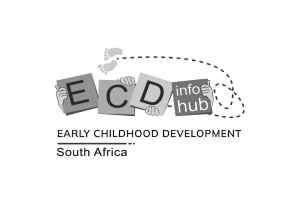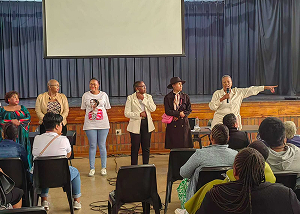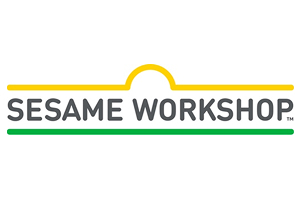What we have learnt and what comes next.
On Monday, 8 September, DataDrive 2030, in partnership with the Department of Basic Education, launched the 2024 Thrive by Five Index – South Africa’s most extensive survey of preschool child development. The Index tracked the developmental status of 4-year-olds across the country and provides critical insights into how South Africa is progressing towards universal access to quality early learning.
The 2024 survey was led by the Department of Basic Education and coordinated by DataDrive2030, with support from the FirstRand Foundation, the LEGO Foundation, This Day Foundation, and Yellowwoods.
The 2024 Thrive by Five Index is historic. It is the largest child development survey of its kind in Africa and is the first reliable baseline and measurement post-COVID. The Index offers a data-driven, nationally representative picture of how South African children are developing before formal schooling, and highlights the structural barriers that shape children’s early opportunities.
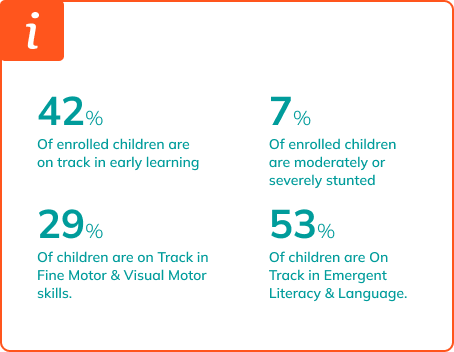
The Index demonstrates that only 42% of enrolled children are On Track in early learning, and children in high-fee preschools are twice as likely to be On Track compared to those in low-fee ones. 7% of enrolled 4-year-olds showed signs of moderate/severe stunting, costing children months of learning.Stunted children are on average 5 months behind their peers in early learning.
Children struggled most in the domain of Fine Motor Coordination and Visual Motor Integration (FMC-VMI) where only 29% of enrolled children are On Track. This matters because fine motor coordination is the bedrock of early literacy.
It is a little more encouraging that 53% of our children are on Track in the Emergent Literacy and Language (ELL) domain which assesses children’s ability to express themselves in full sentences, recognise the initial sounds of words, name common objects, and understand stories they listen to.
For these three domains, Fine Motor Coordination, Visual Motor Integration, and Emergent Literacy and Language, socio-economic background affects children’s developing abilities with the wealthiest children significantly outperforming the rest. Proficiency in both areas is vital prior to commencing Grade R.
The home learning environment is key for developing early language and literacy skills – parents and caregivers can play a significant role by building the vocabulary of children. We should challenge ourselves in our homes to speak to children meaningfully, beyond everyday instructions. We can speak about animals, gardens, or even our families as a way to deliberately expose children to a growing vocabulary.
Among the enrolled children, only 11% of households have more than five children’s books in the home and 26% reported having no children’s books at all. In the non-enrolled sample, 77% of primary caregivers reported having no children’s books at all in the household. This highlights a critical gap in children’s access to early learning resources at home.
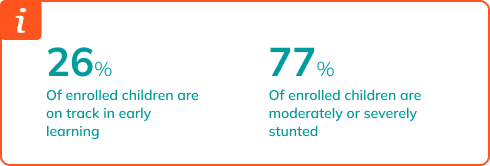
With these statistics in mind and as an investment in early literacy and creating access to books, the DBE has partnered with UNICEF and Book Dash to build a collection of “Stories for Joy” storybooks. These are available in multiple languages and will be publicly available online, for free download, in support of World Literacy Day and International Literacy Month. We encourage parents and caregivers to use all the reading resources available to them to create a culture of reading in the home, to model what reading looks like and to build the vocabulary of our children. These include resources such as those developed by four literacy organisations under the Zenex Foundation Ulwazi Lwethu flagship work. This is a collection of more than 1400 free, open-source materials that span across 9 African languages, with both fiction and non-fiction stories. As journalist and editor, Margaret Fuller said: “Today a reader, tomorrow a leader.”
Robust and rigorous data allows us to develop, prioritise, and champion programmes, projects and partnerships that drive quality and access as we walk the road to 2030. The expanded use of this data to leverage and sharpen our practices with targeted, data driven interventions will bear the true value of this data.
So what now? What should we do next?
We have a lot to do, but with these findings, we have a lot to work with.
We have thousands of entrepreneurial women establishing and leading ELPs in their communities and a vibrant and committed NGO sector supporting these efforts. There is greater access to high-quality data to inform decision-making and unprecedented levels of public investment in ECD. Finally, we have exciting public-private partnerships in planning and provisioning, demonstrated by your presence today and your longstanding commitment to early learning.
There is also evidence that poor outcomes for poor children are not inevitable – the findings clearly show that some children do exceptionally well, despite their impoverished circumstances. These beacons of light point us to strategies that work, showing us where to invest and how to replicate success at scale. This shows us that in spite of the challenges we face, we have hope.
The call to action and government commitment centres on 4 key areas. The first is finance and investment for quality and access, and this is done by making ELP subsidies predictable and reliable, where we pay on time and in the full amount. We also need to remove financial barriers for the poorest 4-year-olds to access ELPs.
The second area we need to focus on is equipping and empowering practitioners and principals by investing in these very women who run early learning centres – they are nation builders. We also need to build practical training for responsive teaching, not just qualifications.
Thirdly, integrated learning, health and parent support is vital. Preschools already deliver meals to hundreds of thousands of children every day – we must support this. We need to partner with the Department of Health to leverage preschools that offer a platform for health outreach. We also need to support and equip parents with basic knowledge on child development and expected milestones, as well as expanding access to books in the home.
Finally, we have to strengthen Grade R because it is the bridge between early learning and school. For children who start behind, it must help them catch up and for those who start strong, it must build on these good foundations. We cannot allow gains made in early learning to fade once children enter school.
The Thrive by Five Index serves as a vital data backbone for the Bana Pele Shared Blueprint, the Department of Basic Education’s roadmap to achieve universal access to quality early learning by 2030. By then, no child should be left behind because of where they were born or how much their parents earn. As the ECD ecosystem works towards this, it is important to remember that access and quality are not just about how many children are reached, but how well services prepare children to thrive. Access opens the door for a child, quality unlocks their potential.
Holistic child development is paramount. We must assess and strengthen the full range of services and support children need – including nutrition, health, protection, responsive caregiving, and early stimulation. This calls for collaboration and partnership across multiple sectors and departments.
As Minister of Basic Education, Ms. Siviwe Gwarube said at the launch: “The Thrive by Five Index is not just a measure, it is a movement – to ensure every child starts school ready to learn, to grow, and to thrive. We know more. Now we must do more. While the index equips us with the data we need to better serve our children, we must remember that behind every number, there is a child’s life.”
-Ms. Siviwe Gwarube, Minister of Basic Education of South Africa

